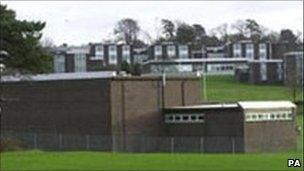Deepcut housing plans go on public display
- Published

Residents fear the impact of traffic generated by housing at the barracks
Opponents of controversial housing plans for Deepcut Barracks in Surrey insist they are not against the development, as long as adequate infrastructure is provided.
Options for redevelopment have gone on public display, with up to 1,200 houses currently earmarked for the site.
But campaigners who have been challenging the plans admit they might accept the levels proposed if the road network could cope.
Public consultation ends on 17 January.
'Mature approach'
Surrey Heath Borough Council, which will oversee the planning process for the 117-hectare barracks, believes the site is suitable for housing, and says the figure of 1,200 is the result of "considerable consultation".
But planning chief Brian Townley acknowledges that people living in the area have concerns about the inadequacy of roads and schools serving the site.
He said: "We've got to have a critical mass in the development to provide that infrastructure, so it is always a balancing act."
Angela Mitchell, head of the Deepcut Liaison Group fighting the proposals, said: "The roads are not there and we are looking for improvements to that to make sure the whole area doesn't get clogged up."
She admitted that if an adequate road system could be built, she probably would not oppose the plans, but she added: "The truth of the matter is we can't see how they can get any new roads in, and the existing roads can't cope.
"Therefore, we don't want that many [houses]."
The area's MP, Education Secretary Michael Gove, has praised the campaigners' "mature approach".
He said: "It's critically important that if houses are built, not just that the infrastructure is there, but we also respect that this is a part of Surrey Heath where woodland and green space needs to be preserved as well."
The Princess Royal Barracks, an army training base, was the centre of controversy when four soldiers died in shooting incidents there between 1995 and 2002, prompting a review of military training.
The Army is due to leave in 2013, when training facilities will be moved elsewhere.
- Published21 December 2010
- Published12 December 2010
- Published8 December 2010
- Published30 November 2010
- Published21 September 2010